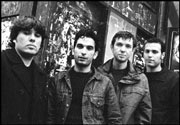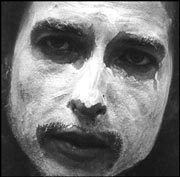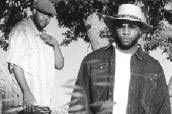SPARTA
LOUDERMILK
Graceland, 381-3094, $8 adv.
9 p.m. Thurs., Sept. 5
You’re my man,” says Jim Ward, by phone from England. “You’re my man.”
To be candid, I don’t really deserve these props from Ward. It’s just that, through a series of combined mishaps—technical glitches, dead electrical cords, weak batteries, and whatnot—most of the music-playing machinery in the house went stupid on me last week, which meant I had no way to listen to Sparta’s Wiretap Scars save through headphones, on a cheap portable player.
As it turns out, this was a blessing in disguise, except for the fact that the high-end guitars nearly fused all the gears in my last working CD gadget.
“I’ve been telling everyone that they haven’t really heard the album unless they’ve heard it on headphones,” Ward explains. “It’s very, very aggressively separated. If you listen to it on headphones, I think it’s a lot better.”
Even discounting the aesthetic considerations, there’s an ideological rightness to that statement. As its title suggests, Sparta’s first album trades heavily on the imagery of surveillance, eavesdropping, and the prevalence of hidden agendas. It only makes sense that a band like this would long to reach people secretly, one by one.
Such, too, were the guerrilla tactics of At the Drive-In, the incendiary El Paso band from whose ashes Sparta rose in 2001. ATDI, as its aficionados dubbed the group, played a brand of intensely politicized music so heavy it threatened to burn out too quickly—as indeed it did. Three months following that band’s publicly announced indefinite hiatus, however, bandmates Tony Hajjar and Paul Hinojos called Ward to ask how he’d feel about going ahead with another project.
“It’s weird,” muses Ward. “You tour forever and eventually you get tired, and all you want to do is go home. But after three months sitting around my house, I was getting bored outta my mind.”
Though Jim Ward played guitar in ATDI, he hadn’t handled lead vocals. In Sparta he performs both duties, and the differences between the two bands are glaringly evident in precisely these areas. Where ATDI’s aesthetic was a wall of noise, with layer upon layer of sonic attack apparent in the mix, Sparta’s music is much more simply constructed.
“I think people have forgotten what only two guitars can sound like,” says Ward. “I mean, if we’d thought it would sound good we’d have layered three or four guitars together, but that wasn’t the sound we wanted. On the whole album, there’s maybe 30 seconds of dual guitar parts.”
The result of such rigid separation—and Wiretap Scars is so separated it’s occasionally uncomfortable to listen to through headphones—is that Sparta’s music achieves a hard-edged intimacy akin to Wire or Fugazi, quite a change from At the Drive-In’s sound. It also doesn’t hurt that Ward’s voice is the perfect vessel for Sparta’s lyric punk poetry, a rag-voiced tenor that skates across the jittery music in a high, staccato delivery.
If their music is more stripped-down, however, Sparta’s lyrics are miles deeper and murkier than the Drive-In’s, though no less apprehensive. “Words speak and choose/Make sense and lose/Capsize the tall tale/But always fail,” Ward sings on “Collapse”; later, on the apocalyptic scorcher “Light Burns Clear,” he screeches: “Fan the flames to the landslide/Crown yourself in the wake/We play this disaster/Fanfare, fanfare, liar.”
“We’re honing our skills,” says Ward of the new album’s more obscure lyrics. “And it helps that everyone writes words for the album; I’m just a ringleader. The guys were writing things down and handing them to me, and I would have no idea what this or that line meant. But I didn’t want to know, because it pushed me in another direction when I brought my own understanding to it. That’s what I love about being in a band. The discovery and the evolution of people’s talents.”
Another thing Ward is coming to love about being in a band, interestingly, is his own increasing concentration on the music, purely and simply.
“We’re all sort of tied to our instruments in Sparta,” he says during a discussion of ATDI’s infamous live shows, “so it isn’t as easy to run around and go nuts. Not that things don’t get broken, still, occasionally. But I’m finding I’m much more into standing onstage and hearing what happens. As for the stage divers [At the Drive-In were known to berate aggressive moshers who were hurting fellow concertgoers, even going so far as to demand they be thrown from the venue], my take on it now, instead of preaching, is just to tell the audience, ‘Look, it’s your show. If there are five assholes in the crowd, there are 400 of you. And 400 people can keep five assholes in line any day of the week.’
“It’s strange,” he muses. “You’d think in a situation like that, the mob rules would prevail. But I guess people always need a little incentive to get active.”








